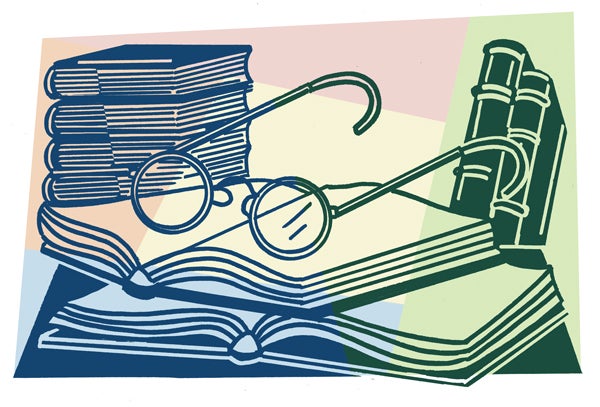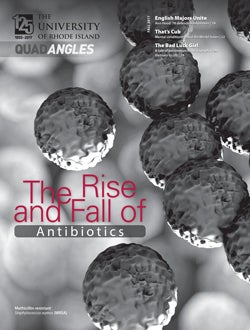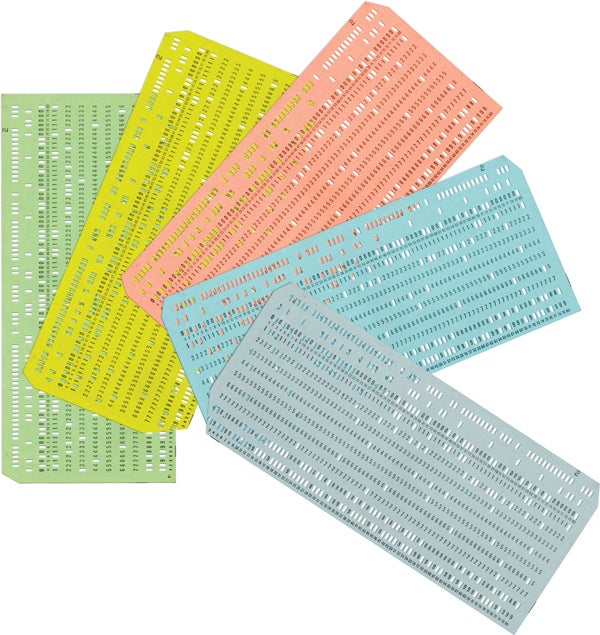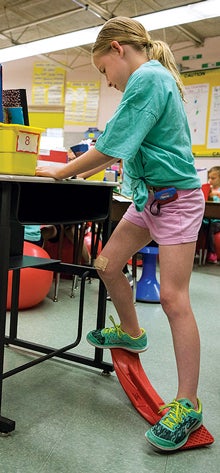Feedback

The Power of an English Degree
To Ann Hood ’78, I could not agree with you more! Ok, I confess, as a URI grad with a B.A. in English and Spanish, mine might not be the most unbiased opinion on the subject. But after years of enduring the quizzical looks and snarky comments (both of which wondered, “What kind of job are you going to get with that?”), I still don’t think of a college education as simply job training.
It took me a couple of years to finally stumble into it, but I found my vocation and passion in the field of learning and development, where there has been no shortage of opportunities to use the written word to connect with people, communicate all kinds of fascinating ideas, and watch them learn and grow.
I have never regretted my choice of study at URI. Although I do share that one about not studying abroad for a semester…
Denise Van Tassell ’82
Nipomo, California
“We are drowning in information,” Pulitzer Prize-winning scientist E.O. Wilson tells us, “while starving for wisdom.”
I love this essay. Thank you, Ann Hood and URI.
Mary M. Hartley ’76
Cranston, R.I.
From uri.edu/quadangles
I loved Ann Hood’s essay in the Fall 2017 QuadAngles! Though I did go into business after earning my B.A. in 1971, my English degree has served me very well in my career. People underestimate the need for people who can write clearly. Ann, I think we both had Dr. Smith for Shakespeare! Your essay supported what I have told my own students for many years!
Janis Dietz ’71
La Verne, California
Thank you so much Ann Hood! This essay is so timely for me, as I witness—year after year—the humanities becoming less and less significant in the district where I teach and where technology gets all the attention and funding. I will share this with my colleagues and my students, who are book lovers, so they realize that technology is not the end-all, be-all.
Lisa Laferriere
North Scituate, R.I.
From uri.edu/quadangles

Probiotics with Antiobiotics
I was very interested to read the article “The Thin Red Line” in your QuadAngles [Fall 2017] this past month. It was disappointing, however, to hear no mention of the use of probiotics in helping gut flora to maintain while on a course of antibiotics. Except for a slight mention of investigation into their uses in aquaculture, it was completely ignored.
When will the medical profession and scientists start encouraging the use of specific probiotics when prescribing an antibiotic? I am fortunate to have a physician here in San Diego and one previously in Boston who are savvy enough to do this.
The cases of Clostridium difficile are rising rapidly in children who are given antibiotics with no instruction to add a probiotic to the treatment. I believe—as do many others and, surely your pharmacists, scientists, etc. quoted in the article—that this would be helpful.
Christine Curley (wife of John Curley ’65)
San Diego, California


Those IBM Punch Cards
My first experience with digital computers was in a URI course in the spring of 1966, just before I graduated with a BSME degree. Since the Computer Science Department had apparently not yet been created, it must have been a math course. The punch cards (Hollerith cards, more formally) were actually a good way to program. They were very durable, with people keeping and running their card decks for years.
I took a job with Monsanto in Springfield, Mass., at graduation. There I got to use an IBM 1620, which I believe was the first mass-production machine designed expressly for engineering calculation. It was run “open shop”: you actually got to throw switches yourself. The first problem I programmed was to calculate the transient temperatures at various points in a shell-and-tube heat exchanger. It took the 1620 more than 5–6 hours to calculate for 60 seconds of transient time. The 1620 had a main console about the size of a desk, with 8k of memory, and there was a second console with another 8k. Might seem primitive by today’s standards, but this machine was a vast improvement over using adding machines and slide rules.
Don Champagne ’66
Silver Springs, Maryland
From uri.edu/quadangles
 Correction
Correction
Caighln Perrin ’01 should have been identified as a URI alumna in the story “Helping Wigglers Become Learners” in the Fall 2017 issue. She graduated with a B.A. in Communication Studies in 2001.
 Home
Home Browse
Browse Close
Close Events
Events Maps
Maps Email
Email Brightspace
Brightspace eCampus
eCampus


